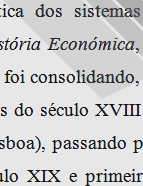

................................
This societal history covers not only social history but also economic history. Secondly, by publishing a vast collection of archival sources in Portugaliae Monumenta Histórica, he provided essential elements for future historians' research, benefiting scholars such as Alberto Sampaio, Francisco Martins Sarmento, Oliveira Martins, and many others, including those of the present day. Herculano’s definition of history as a "social science destined to enrich the future with the experience of the past" (Jorge Borges de Macedo, "A História de Portugal nos séculos XVII e XVIII".. ....[History of Portugal in the 17th and 18th centuries], 1971, p. 14) underlines the importance of valuing other aspects of reality, including the economic, beyond the traditional political, military, and diplomatic domains. Luís A. Rebelo da Silva (1822-1871) was also attentive to the economic conditions of Portugal. After his preparatory studies in Lisbon, he read Mathematics at the University of Coimbra but abandoned the course due to health issues. He then pursued humanistic studies and held various positions, including Professor of the Curso Superior de Letras, founded by King Pedro V (1859), where he taught History. Among his extensive works, the História de Portugal nos séculos XVII e XVIII (5 vols., 1860-1871) is noteworthy. While his main focus was primarily on political, military, administrative, and diplomatic history, Rebelo da Silva also addressed economic history topics in several passages of this latter work: "Agriculture, commerce, and industry," "Crisis of the royal treasury. Revenues and expenses" (vol. 3, book II); "The weavers of Lisbon" (idem); "Economic state of the country," "Stagnation of wealth sources," "Agriculture, industry, and commerce," "Decline of public revenues" (vol. IV, book V). He also delved into economic history more systematically and extensively in vol. IV, particularly in book VI, which is dedicated to the "Economic and social state of the economy": "Population and agriculture," "Manufacturing industry." However, he developed more on the subject of commerce. Thus, J. Borges Macedo's statement is all the more understandable: "His work is the first political history that organically includes an economic history defined as such" And he concludes: "Portuguese economic history began with Rebello da Silva" (Borges de Macedo, Idem, pp. 100 e 118). Joaquim Pedro de Oliveira Martins (1845-1894) is another towering figure in Portuguese historiography, whose extensive and multifaceted body of work spans various themes in the humanities and social sciences.
